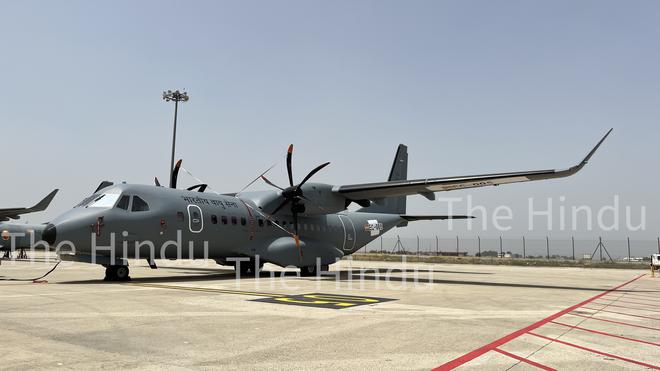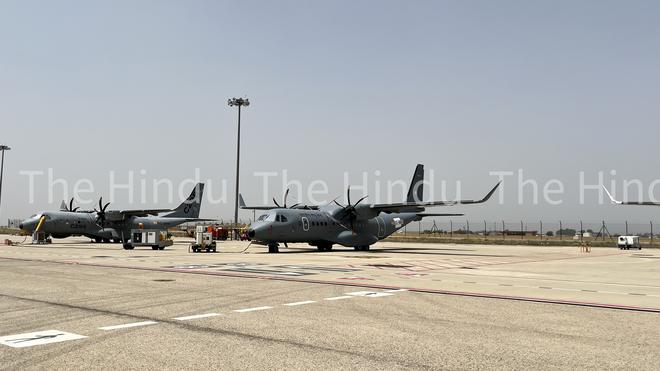In about 45 days from now, in September, the Indian Air Force (IAF) will receive the first C-295 transport aircraft and ahead of it, six pilots have been trained in Seville by Airbus and training of a 20-member maintenance crew is currently under way. Ground breaking ceremony for a training centre at Air Force station, Agra, was done in March with a full motion simulator to be delivered by the end of 2024. Work is under way for setting up the Final Assembly Line (FAL) at Vadodara in partnership with Tata Advanced Systems Limited (TASL), according to Jorge Tamarit, head of C-295 India programme, Airbus. The first aircraft manufactured in India would be delivered in September 2026.
“The FAL in Vadodara will be ready by mid-2024 and start production by November 2024,” Mr. Tamarit said speaking to a small group of visiting journalists from India. “Next week the Main Constituent Assembly [MCA] in Hyderabad is set to start production where several major sub-assemblies for the 40 aircraft to be assembled in India would be made, beginning with the rear-end fuselage.”
Explained | The C-295 and India’s aircraft industry
The second C-295 will be delivered in May 2024 followed by seven aircraft in 2024 at the rate of one per month, said Jorge Madrid, head of C-295 India-version development programme.
In September 2021, the Defence Ministry signed a ₹22,000-crore deal with Airbus and Space S.A., Spain, for procurement of 56 C-295MW transport aircraft to replace the Avro aircraft in service with the IAF. As per contract, 16 aircraft would come in fly away condition, manufactured at the Airbus facility in Seville, and 40 would be manufactured in India by Airbus jointly with TASL.
The C-295 has a capacity of 9 tonnes and can carry up to 71 troops or 50 paratroopers. Eventually, IAF will become the largest operator of the C-295.

Talking of the uniqueness of the deal, Mr. Tamarit said the contract involving ‘Make-in-India’ and offset obligations is unprecedented. Airbus has not done a full production system ever, he said stating the deal involves 30% offset obligations on top of ‘Make-in-India’ obligations. The contract includes service support programme: spares, ground support and test equipment, tech publications, training, training devices, performance-based logistics contract. In March, the contract for Performance Based Logistics (PBL) for five years was signed as per which a fleet availability rate of 85% rate would be ensured. Also the contract for supply of spares is for 10 years covering 10 operating bases.
The FAL spread over 36 acres will be ready by mid-2024 and operations will start by November 2024. All parts produced in Hyderabad will be shipped to Vadodara for the final assembly.
The MCA in Hyderabad is set to start production by next week beginning with the rear-end fuselage, followed by rear fuselage, centre fuselage and so on. We are doing fortnightly deliveries of tail parts to India, Mr. Tamarit said. These are for the 17th C-295 which will be the first aircraft to be manufactured in India. The first ‘Make-in-India’ aircraft is scheduled to be delivered in September 2026 and the contract would be completed by 2031.
Indigenous radar warning receiver and missile approach warning systems made by Bharat Electronics Limited (BEL) and counter-measure dispensing system made by Bharat Dynamics Limited (BDL) have been certified and installed on the first aircraft, Mr. Madrid stated.
In all, 14,000 detailed parts would be made in India and roughly around 3,500 parts will be industrialised every year, said Mr. Tamarit. Tata-produced parts would be sequentially incorporated from aircraft 17 to 32 and from the 30th aircraft onwards 100% of the tail parts and labour would be in India. The last eight aircraft from 32 to 40 would have the maximum indigenous content, he said, adding the scheduled delivery of the 32nd aircraft is in the first quarter of 2029. “We measure indigenisation by labour hours and by the 32nd aircraft it will reach 98%.”
Engines, avionics and some systems like landing gear are not done by Airbus and would be sourced directly. So Tata will not be doing them as well as a small number of detailed parts, Mr. Tamarit noted adding some technologies like Chemical Milling will be transferred by Airbus to Tata. “It is an Intellectual Property licence agreement.”

The project will create 15,000 direct jobs and 10,000 indirect jobs over the coming 10 years. Airbus currently employs over 2,750 full-time employees in India and its exports from supply chain is $750 million per year in terms of components and services.
Under the offset obligations, to begin with it will be direct sourcing and Airbus is looking to diversify, officials added.
A deal for 15 more C-295s to be converted into a maritime role for the Navy and Coast Guard by the Defence Research and Development Organisation is in the pipeline and discussions are on for it, company officials said. Approval from the Defence Acquisition Council (DAC) is awaited for this.
The IAF has 56 Avro transport aircraft procured in the 1960s and in urgent need of replacement. The Request For Proposal was issued to global firms in May 2013 and the sole bid by Airbus and Tata Group with the C-295 aircraft was approved by the DAC in May 2015.
(The writer was in Spain on the invitation of Airbus.)







